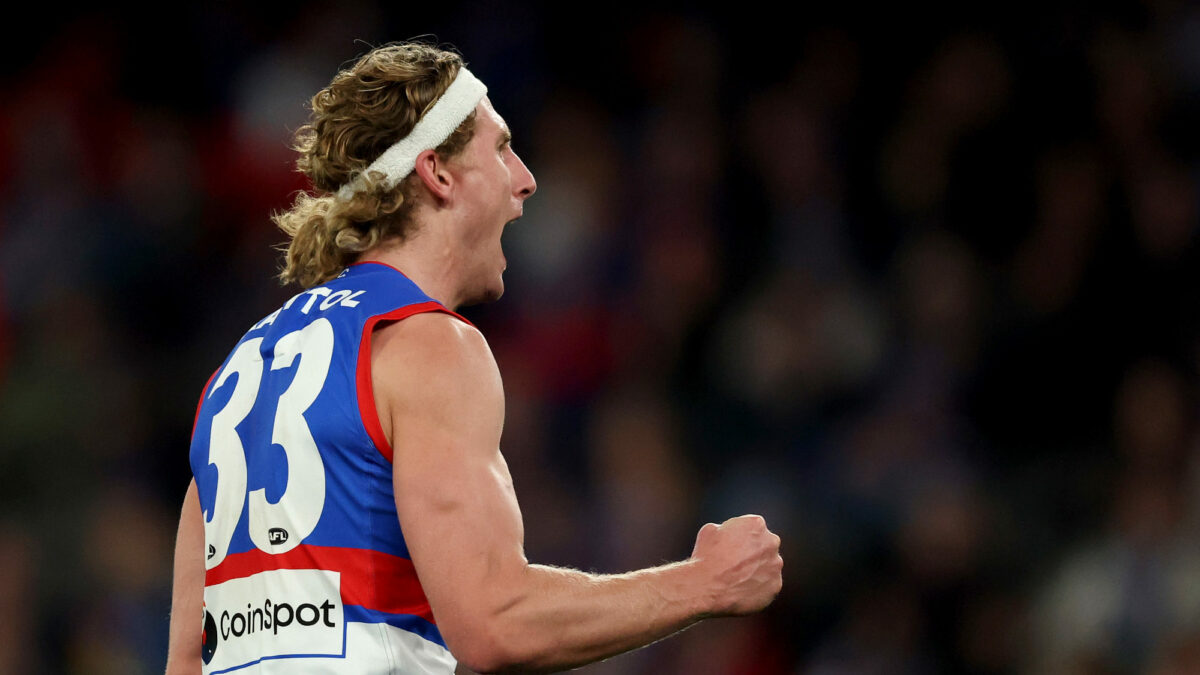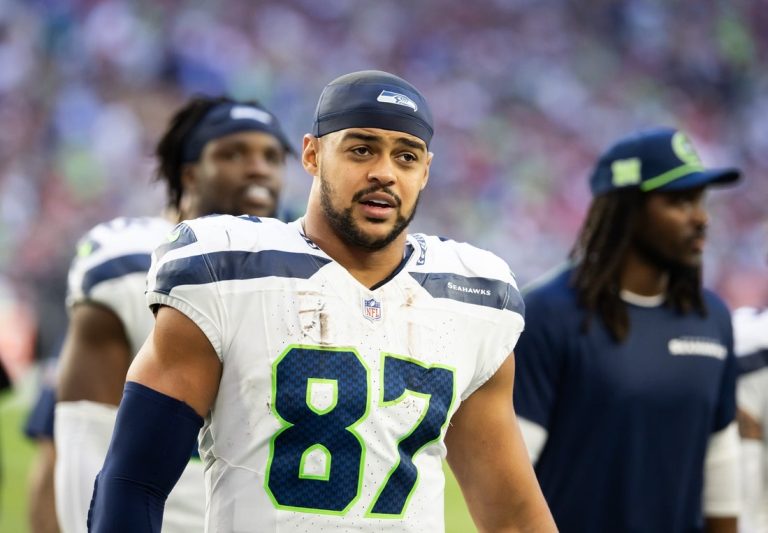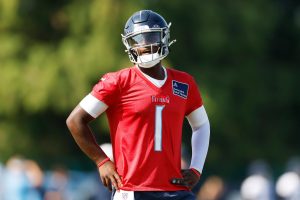Imagine being the clear ninth-best team in the competition, sitting two games outside the eight with four to come, taking on a red-hot rival on a six-game winning streak … and putting on a massacre.
Such was the Western Bulldogs’ Thursday night at Marvel Stadium, with their 88-point annihilation of GWS either a godsend for the seven other teams clamouring for top-four berths and home finals in the run home, or the worst possible result, or perhaps both.
Fremantle and especially Hawthorn now have a percentage gap on the Giants, who lost the infeasible amount of seven per cent out of this disasterclass … but at no point in the last decade will a slip-up in the final month of the home-and-away season be costlier.
It’s a loss that confirms the Giants, for all their brilliance when at full flight, have fatal flaws that likely leave a maiden premiership out of reach: most notably, their inability to stop teams from translating contested possession dominance into quick spread to expose their defence, and their struggle to retain possession when denied fast footy through the corridor.
This is a Bulldogs team that has had them by the proverbials for the entire 2020s to date, with one win in that time over their unlikely archrivals: it’s a hoodoo caused by a midfield repeatedly unable to stop what has consistently been the Dogs’ biggest strengths.
Their Round 7 loss to the same opponent bears remarkably similar reading, if with a substantially inflated scoreline this time around: combined, they have lost the clearance count 96-57, and unlike Hawthorn, who earlier this season were able to curb the Bulldogs’ clearance wins with ferocious pressure on those fast handballs in traffic to get the ball into space, the Giants had no plan to win it back.
The result was the Dogs once again doing as they pleased offensively: and with Aaron Naughton and Sam Darcy on fire in attack and no Jack Buckley to offer Sam Taylor aerial support, it was a bloodbath.
The above is a perfect summation of the Bulldogs’ stoppage dominance all evening: Tom Green, the Giants’ best clearance player, sits free at the centre bounce and watches Kieren Briggs’ hand like a hawk ready to shark the tap. But reading it better than Stephen Coniglio is Marcus Bontempelli, who via a clever knock to Tom Liberatore, Green’s nominal opponent, allows the Dogs a fast break, a well-placed kick inside 50, and a Darcy mark Taylor can do precisely nothing about.
It’s worth noting this has been the Giants’ go-to centre bounce group for the past three weeks, since Coniglio’s return from injury: but aside from the first five minutes, when the Giants won three straight centre clearances via some excellent ruckwork from Briggs, the midfield was completely dominated by red, white and blue jumpers.
To the Dogs’ credit, though, this victory was predicated on their ability to do what the Giants couldn’t do them, and shut down their opponents’ biggest strength.
For the last ten weeks – and really, for the better part of the last decade – GWS’ most infamous method has been the Orange Tsunami from defence to attack. Over those ten weeks, only Adelaide have a greater differential of scoring to conceding via this, while only Geelong and the Bulldogs themselves have scored more from it.
Yet it was eye-catching from very early on just how stagnant the Giants were, how totally unable to move the ball with any fluency from defensive 50 without quickly needing to kick long to a contest. Corridor movement was virtually nonexistent, while the Dogs ruthlessly pounced on any turnovers in attempting to find it – one first-quarter goal after a kick to Finn Callaghan fell short and caused a disputed ball the perfect example.
Here is how they set up before the turnover:

It’s an ideal mix: the Giants have kept numbers clear of the corridor to allow a fast break if they can hit it, but the Dogs have clogged up space with Joel Freijah (No.27) and Rhylee West, to the right of screen, both ready to converge on anyone attempting to use the free area around the centre circle.
It was like this all evening: from kick-ins and defensive Giants intercepts especially, denying them the ability to go straight up the spine and forcing them to kick laterally.
When you combine that defensive set-up with a team desperate to try and attack the corridor regardless, mistakes happen: the kick drops short of Callaghan, who had made a break to try for an unconsted mark, and the Dogs pounced and goalled from the turnover.

It’s incredible how much more imposing the Bulldogs’ backline, mincemeat against good teams all season, looked with this amount of help ahead of the ball: a key forward line featuring Jesse Hogan, Aaron Cadman and Jake Riccardi, all players more than capable of swamping the Dogs like Riley Thilthorpe, Darcy Fogarty and Taylor Walker did for the Crows or any number of other talls this season, barely took a mark inside 50 all evening.
Instead, the Dogs forced long, high balls inside 50 from the Giants, meaning all James O’Donnell, Jedd Busslinger and Rory Lobb needed to do was spoil rather than deal with an opponent leading into space: meanwhile, at ground level, they dominated, winning the contested possession count in their defensive half by 16 in the first quarter, when the match was on the line.
With Tim English comprehensively blowing up Briggs around the ground and time and again working back into the hole to provide another tall wall the Giants needed to kick around and failed, among the most potent sides in the competition, against one of the weakest defences, was restricted to six goals for the match.
All of this might mean everything, or it might mean nothing. The Dogs’ season will remain alive until at the very least the final two days of the season, even if they do something disastrous like losing to Melbourne next week. There’s a chance now that an unlikely home final could be snatched if results go their way, too.
They’re a fascinating watch because, while their ultra-aggressive style seems completely unsuited for the environment of finals, while they haven’t beaten any top-eight team not named the Giants this season, their best is so devastating that I don’t think they’d be any finalist’s pick to play in a cutthroat elimination final, home or away.
As for the Giants, two of their last three are simple on paper, but in the race to 15 wins their percentage is potentially their weak link. It looks likely now that this thrashing will leave them stuck behind Hawthorn and Fremantle permanently should premiership points not be enough to get them in.
Put it this way: the Giants, off the back of six straight wins, were due an off night. It could even have been budgeted for. But they simply couldn’t afford to be wiped off the park in the manner that the Bulldogs did: and it’s not just a singificant dent to their premiership credentials, it might end up costing them a shot at September at all.







